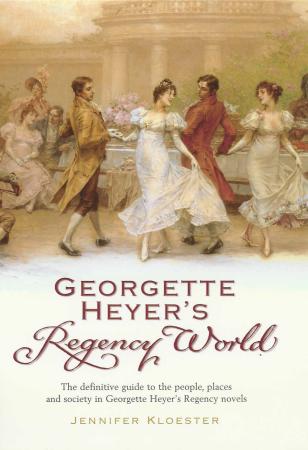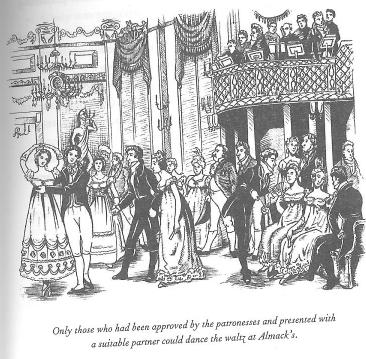
- Info
- Who is she?
- Heyer's 1984 bio
- Heyer's 2011 bio
- Who am I?
- Visit The Pump Room
- Subscribe to Updates
- Novels
- Romances, Historicals
- Mystery
- Other writings
- Random read
- Fun
- Generally
- Quizzes
- Movies
- The Challenge
- Get some!
- Buying Books?
- Heyer's World
- Heyer's Regency
- Figurines
- Links
- Heyer Sites
- Regency Info
- Regency Reading
Georgette Heyer's Regency World
by Dr Jennifer Kloester
Chapter 8: Rules and Etiquette

Rules and etiquette were particularly prevalent among the upper classes with some kind of protocol laid down for every social situation. Very few of these rules were written down, however, and variations could apply depending on the circumstance. The most rigid protocol was applied at Almack's club under the beady eye of its patronesses. Attendees had to enter the rooms before eleven o-clock or be barred from the door. Formal evening dress was essential: the ladies in their most beautiful gowns and jewels and the men in long tail-coats, white cravats, knee-breeches and stockings, and carrying a chapeau-bras. As Mrs Scattergood sternly told Perry in Regency Buck, under no circumstances were men to be admitted wearing ordinary breeches, trousers or pantaloons. Once the waltz was introduced into the clubrooms a young lady could only participate in it with the patronesses' approval and on their presenting her with a suitable partner.
In society there were a great many other rules and points of etiquette which were understood and generally observed. In addition to the more deep-seated social structures that dictated the mating game, the choice of spouse and the conduct of married couples, many of the rules governed the behaviour between men and women and between the various ranks in th e social heirarchy.
- Social connections were usually formed through a series of meetings, usually beginning with morning calls to the homes of those in fashionable society.
- Morning calls were generally undertaken in the afternoon.
- A morning call did not usually exceed half an hour.
- In London, a woman paid morning calls to her social equals or inferiors but not to her social superiors until they had called on her or left a card.
- A person new to the city or country area waited for calls of ceremony to be made to them by those already established before they made a call of their own.
- In the country it was acceptable for a man to make a call or leave a card with someone of higher social standing if they were new to the neighbourhood.
- A gentleman calling on a family asked for the mistress of the house if the visit was a social one, and the master if it was a business call.
- A card was left if the lady of the house was indisposed or not at home. It was acceptable for a gentleman to call on a daughter of the house if she were well above marriageable age or a long-standing friend.
- Callers were received by men in their business room or library, by women in the morning room or in their drawing-room.
- A lady, either married or single, did not call at a man's lodging.
- A lady was permitted to drive her own carriage, but only about the town attended by a groom, or by herself on the family estate.
- A lady never drove on he open road or engaged in any kind of public contest or race.
- It was acceptable to go out riding or driving with a man as long as a groom or other chaperone was in attendance.
- It was acceptable to go out driving or riding with a man without a chaperone if he was a relative of close family friend.
- Galloping in Hyde Park was prohibited.
- During the season it was essential to be seen in Hyde Park during the promenade hour of 5.00 to 6.00 pm.
- Servants and social inferiors were always kept at a proper distance but without arrogance, pride or aloofness.
- Servants were spoken to with exactly the right degree of civility and never with the casual informality with which a person would speak to an equal.
- Neither a lady nor a gentleman discussed private business in the presence of servants.
- Servants were generally ignored at mealtimes.
- It was essential to dress for dinner.
- When going in to dinner, the man of the house always escorted the highest-ranking lady present. The remaining dinner guests also paired up and entered the dining room in order of rank.
- Dinner guests were seated according to rank, with the highest-ranking lady sitting on the right-hand side of the host, who always sat at the head of the table.
- When dining informally it was acceptable to talk across or round the table.
- At a formal dinner one did not talk across the dinner table but confined conversation to those on one's left and right.
- Ladies were expected to retire to the withdrawing room after dinner, leaving the men to their port and their 'male' talk.
- A hostess should never give the signal to rise from the table until everyone at the table had finished.
- It was acceptable to offer one's snuff-box to the company but not to ask for a pinch of snuff from anyone else.
- Overt displays of emotion were generally considered ill-bred.
- Laughter was usually moderated in polite company, particularly among women.
- Men could give themselves up to unrestrained mirth, provided they were in the company of other men or among women of low repute.
- Well-bred persons controlled their features, their physical bodies and their speech when in company.
- A lady always spoke, sat and moved with elegance and propriety.
- A bow or curtsy was always made when meeting or speaking to royalty.
- Children always bowed or curtsied on meeting their parents for the first time each day.
- A bow or curtsy was executed according to the status and relationship of the person encountered and with regard to the particular circumstance.
- A bow was made on entering or leaving a room, at the beginning and end of a dance, and on encountering any person one wished to acknowledge.
- Debutantes did not stand up for more than two consecutive dances with the same partner.
- Only those young ladies who were 'out' danced the waltz and then only with an acceptable partner, usually someone she already knew, or to whom she had been formally introduced.
- Full mourning dress was worn for an appropriate period, which varied depending on the mourner's relationship to the deceased. A person did not go into society while in full mourning. Half mourning (usually grey or lilac) could be worn after an acceptable period of mourning had been observed and the mourner could choose to attend social functions but not fully particpate in them.
 Every well-born lady and gentleman also knew the unwritten rules and
understood the social niceties that set them apart from the less
'cultured' masses. These were often the tiny details and nuances of
socially acceptable behaviour that were instilled from an early age and
which were often only discussed in private.
Every well-born lady and gentleman also knew the unwritten rules and
understood the social niceties that set them apart from the less
'cultured' masses. These were often the tiny details and nuances of
socially acceptable behaviour that were instilled from an early age and
which were often only discussed in private.
- To be thought 'fast' or to show a want of conduct was the worst possible social stigma.
- A lady never forced herself upon a man's notice.
- No lady was to be seen driving or walking down St James's Street where several of the gentlemen's clubs were located.
- No lady was to walk or drive unattended down Piccadilly.
- No female was to refer to any of those male activities about which a lady should feign ignorance.
- A husband was expected to keep his indecorous activities and less cultured friends separate from his marriage.
- A wife was expected to be blind to her husband's affairs.
- A married woman could take a lover once she had presented her husband with an heir and so long as she was discreet about her extramarital relationships.
- Women were expected to be ignorant of any proposed duel.
- A lady did not engage in any activity that might give rise to gossip.
- Subjects of an intimate nature such as childbirth were never discussed publicly.
- When out socially a lady did not wear a shawl for warmth no matter how cold the weather.
- A gentleman was expected to immediately pay his gambling debts, or any debt of honour.
- It was unacceptable to owe money to a stranger.
- It was acceptable to owe money to a tradesperson.
- It was considered bad form to borrow money from a woman.
- A female did not engage in finance or commerce if she had a man, such as a husband, father or brother, to do it for her.
- A lady did not visit a moneylender or a pawnbroker.
- Extremes of emotion and public outbursts were unacceptable, although it could be acceptable for a woman to have the vapours, faint, or suffer from hysteria if confronted by vulgarity or an unpleasant scene.
- A well-bred person behaved with courteous dignity to acquaintance and stranger alike, but kept at arm's length any who presumed too great a familiarity. Icy politeness was a well-bred man's or woman's best weapon in putting 'vulgar mushrooms' in their place.
- A well-bred person maintained an elegance of manners and deportment.
- A well-bred person walked upright, stood and moved with grace and ease.
- A well-bred person was never awkward in either manner or behaviour and could respond to any social situation with calm assurance.
- A well-bred person was never pretentious or ostentatious.
- Vulgarity was unacceptable in any form and was to be continually guarded against.
- Indiscretions, liaisons and outrageous behaviour were forgivable
but vulgarity never was.
Copyright © Jennifer Kloester 2005